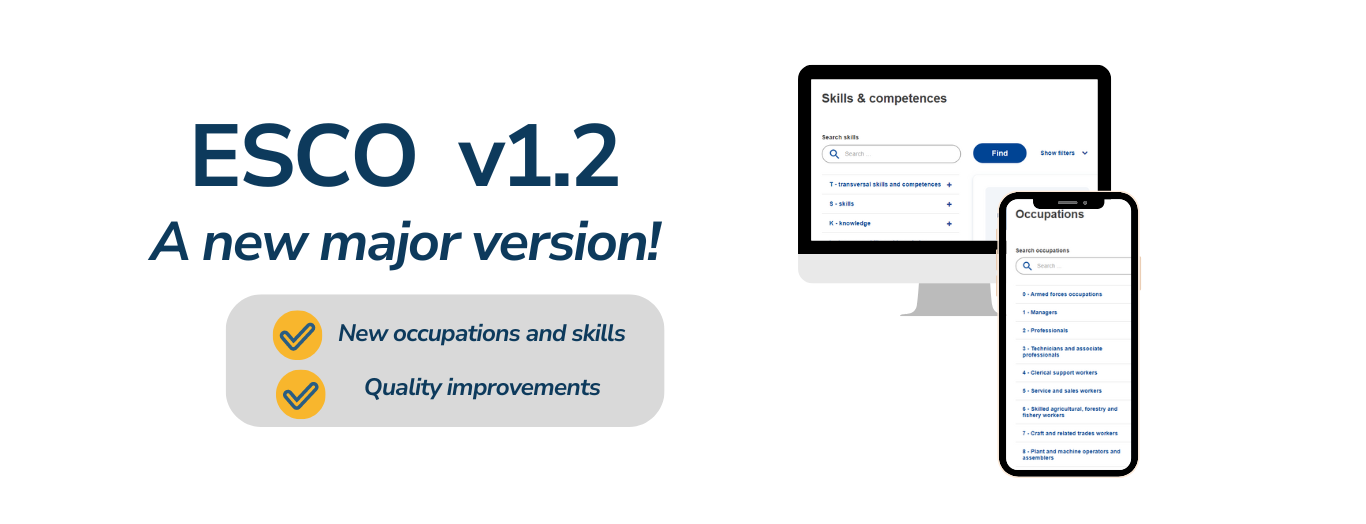ESCO v1.2 is live!
A new major ESCO version is now available!

The Commission has published the new version of the European classification of Skills, Competences, Occupations and Qualifications (ESCO). This update cycle of ESCO v1.2 was focused on the green and digital transition, and on skills and occupations linked to the emerging technologies. ESCO v1.2 is one of the many initiatives under the European Year of Skills.
The Commission developed ESCO v1.2 based on a data-driven approach which combines human expertise and AI techniques for content creation and quality improvement. This includes leveraging AI to extract information on occupation and skills terms used in online job advertisements, courses and qualifications, national and international classifications of skills and occupations, sectoral publications and analyse them by using customized AI models to identify links with existing ESCO terms.
What has changed?
ESCO v1.2 includes:
- 35 occupations, 42 new skills and 196 new knowledge concepts have been added to the classification;
- 677 alternative labels are added to new or previous ESCO concepts, together with 96 hidden terms;
- 18 quality improvements tasks were performed. Over 12000 concepts have been updated. Improvements range from removing duplicate terms, correction of orphan skills, reallocation of skills and knowledges in the skills hierarchy;
- Improvements on existing translations in 8 languages and inclusion of national sign languages.
ESCO v1.2 will be officially presented in an online webinar on 21 May 2024. Register and find out more!
The Commission would like to thank all the organisations who supported the update of ESCO and the release of ESCO 1.2. during this two-year process. We name all the contributors below:
- ALBATTS (https://www.project-albatts.eu/en/home)
- ASSETS+ (https://assets-plus.eu/)
- AWS (https://aws.amazon.com/?nc2=h_lg)
- CEDEFOP (https://www.cedefop.europa.eu/en)
- CHAISE (https://chaise-blockchainskills.eu/)
- Dassault Systemes (3DS) (https://www.3ds.com/)
- Baden-Wuerttemberg Cooperative State University (https://www.dhbw.de/english/home)
- ESSA (https://softwareskills.eu/)
- ETF (https://www.etf.europa.eu/en)
- EQVEGAN (https://eqvegan.eu/)
- ENISA (https://www.enisa.europa.eu/)
- EPBS – European Association of Biomedical Scientists (https://epbs.net/)
- FIELDS (https://www.erasmus-fields.eu/)
- Fórum Tecnologias da Saúde (FTS) (https://apsai.pt/a-associacao/filiacao/5-filiacao)
- METIS (https://www.metis4skills.eu/)
- REWIRE (https://rewireproject.eu/blueprint/)
- Sector Skills Strategy in Additive Manufacturing (SAM) (https://www.skills4am.eu/index.html)
- SKILLSEA (https://www.skillsea.eu/)
- SPIRE-SAIS (https://www.aspire2050.eu/sais)
What is new on the ESCO portal?
To support ESCO implementers that would like to obtain a quantitative measure of the skills relevance for single ESCO occupations, ESCO offers Skills-Occupations Matrix Tables that detail the share of ESCO skill groups for each occupation. This share is calculated based on the existing skills-occupations relations in ESCO occupations and skills, and therefore reflect the importance of a skill group for an occupation.
As from ESCO v1.2, this data is included in the occupation profiles. Users are now able to see skill group shares for each occupation directly in the portal, offering a more intuitive understanding of skill relevance and potentially increasing the usability of the ESCO skills hierarchy.
How to access ESCO v1.2?
The occupations, skills and competences in the updated classification in all ESCO languages are available in the ESCO portal, in the Download Section, and via API.
In the Download Section page you will find more information on how to download specific packages in various formats. To access ESCO v1.2 via API, users can make HTTP requests to the ESCO server using endpoints specific to version 1.2, providing necessary authentication tokens and parameters. By incorporating these API calls into systems, users can integrate the latest ESCO version into their applications and services.
In the download section users can as well access the Delta File which includes the key information of the concepts that changed in the reference version compared to previous ESCO versions. To obtain this file insert the following filters: the version “ESCO dataset – v1.2.0”, the content “delta”, the language “Language independent”, and the file type which in the case of delta files is only “csv”.
Finally, the ESCO Secretariat is always available to support implementers. May you have any question, please contact us via Contact Form.
